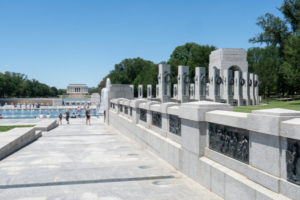Toll-Free US & Canada 24/7:
1-770-659-7014
As a precautionary health measure for our support specialists in light of COVID-19, our phone support option will be temporarily unavailable. However, orders are processed online as usual and communication via live chat, messenger, and email is conducted 24/7. There are no delays with processing new and current orders.
A Political Science Discussion – What Did Mankind Learn from WWII?
Violence is a poor solution to human problems
Any human conflict can be quickly resolved by using brutal force. However, with such an approach, the loss of human lives, the violation of human rights, the destruction of security and freedom becomes inevitable. Such a “solution” does not solve humanity’s problems at all but only makes them worse. Sooner or later, the anger will accumulate and explode, and the conflict will be on the surface again.
From the lessons of WWII, we know that violence can only cause further violence. Moreover, history teaches us that military victories and defeats are short-lived. There were many examples of different countries concluding peace treaties only to secure more time to prepare for war.
The same applies to family and friendships. Sometimes we succumb to a feeling of anger and even show cruelty – but in most cases this only signals weakness. By succumbing to malice, we lose the amazing human ability to distinguish truth from falsehood.
War is ugliness and vice
The desire for war is part of human nature. Philosophers and scientists continue to argue whether humans are born good or evil, but the reality of constant violence and wars tells us that there is definitely something evil in each of us. Aggression is believed to be one of our main instincts and even if we suppress it for a while the beast inside us will come to the surface sooner or later by even the tiniest trigger.
The wars of the last century taught a cruel lesson to our grandparents. Their generation cried out: “Never again!” And it was they who showed how effective rejection of violence can be as a way of resolving conflicts.
War, by definition, is ugliness and vice. We must learn important lessons from the past and embark on the path of nonviolent dialogue with the outside world. Do not succumb to the blinding fear that entails bitterness, anger, and a thirst for revenge. On the shoulders of each of us lies the responsibility to ensure that the 21st century does not see a recurrence of suffering, destruction, and bloodshed.
Will we be wise enough not to destroy ourselves and our planet with nuclear and chemical weapons, including deadly viruses like the COVID-19?
We are the first generation of world citizens
The Internet changed everything. It brought together people from all over the world. Thanks to the advancement of technology, we are the first generation of true citizens of the world. We know that all people are at our reach and can communicate with us freely.
It’s up to us how to use this new technological power. One can get addicted to games, harmful chemical substances, or spread nonsense and aggression. Or we can share what is really important to us, be good to others and foster peace and cooperation for the common good of all mankind.
Walls are no longer needed
We are separated not only by physical walls but also by those that are erected in our souls. These are the walls of selfishness, radical nationalism, individualism, pride, and greed. Everything that separates people is a relic of the past. All the obstacles separating us will be powerless in the face of striving for peace. And the barriers will inevitably collapse with time.
The future depends on each of us
Our every action, word, and even though resonates and affects the world. Look at the communication on the Internet: every time we write, say or share something, we spread it across the global network. This opens up tremendous opportunities, but also imposes responsibility. The future depends not only on politicians, top managers, or the UN. Without exaggeration, it depends on each of us.
No one alone can solve global problems. However, everyone can start with themselves. First, only a few people will follow us, then a dozen, followed by a hundred, a thousand, and tens of thousands of people. For the sake of living in peace, we must try to multiply the good and suppress the bad in ourselves.




